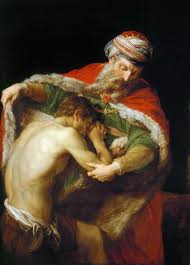 Tomorrow we get to hear the great story of the Prodigal Son (if that is the pericopal system that your church follows) and some have said that it may be the most popular story in literature. It is mentioned more than any other parable in Shakespeare for instance. Someone has said that it is a kind of “touchstone of literary consciousness” (David Lyle Jeffrey, “Brazos Theological Commentary on the Bible” Brazos, Grand Rapids 2012). Everyone can identify with the Prodigal and the older brother if we are honest. Some of us can identify with the Father, who even in a moment of absolute joy, has to deal with a whining self absorbed “basement boy”. Well, that may have been a bit harsh. The elder son in the parable is, seemingly, a hard worker. He is coming in late from the fields when he hears music and dancing. His words of bitter pain at never even having a goat that he could barbeque with his friends, bring all the slights, real and imagined, in the family struggles of households with more than one child.
Tomorrow we get to hear the great story of the Prodigal Son (if that is the pericopal system that your church follows) and some have said that it may be the most popular story in literature. It is mentioned more than any other parable in Shakespeare for instance. Someone has said that it is a kind of “touchstone of literary consciousness” (David Lyle Jeffrey, “Brazos Theological Commentary on the Bible” Brazos, Grand Rapids 2012). Everyone can identify with the Prodigal and the older brother if we are honest. Some of us can identify with the Father, who even in a moment of absolute joy, has to deal with a whining self absorbed “basement boy”. Well, that may have been a bit harsh. The elder son in the parable is, seemingly, a hard worker. He is coming in late from the fields when he hears music and dancing. His words of bitter pain at never even having a goat that he could barbeque with his friends, bring all the slights, real and imagined, in the family struggles of households with more than one child.
The Prodigal traveled off to a far country taking his inheritance and leaving all he knew behind him. It is a place of strangers bad choices. I like the “far country” image. It is evocative and sad. The Far country is not the “home country”. St. Augustine picked up on that idea in a sermon. He called the home country that we travel to the new Jerusalem. It is eternal life.
“There is another life . . . a home country where no violence, no enemy is to be feared; there is a home country walled around by the will of God, encircled with the shield of God’s goodwill, where no foe is ever allowed in and no friend perishes; there is a home country where nobody leaves dependents behind, nobody is succeeded by heirs. That country is called Jerusalem, “vision of peace.”

